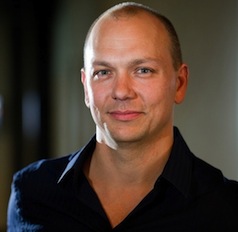Lately, the Bay Area tech community has come under fire for being overly detached from the broader community. But no one could accuse Chris Redlitz, a local venture capitalist, of being elitist.
Three years ago, Redlitz cofounded the non-profit Last Mile program — an entrepreneurship course for inmates at California’s San Quentin prison. Today, Redlitz, who also cofounded Transmedia Capital in San Francisco (it has backed Newsle, Rap Genius, and TrialPay among others) is busily teaching volunteers how to replicate the model at L.A. County Jail. A state prison in Michigan is next, according to Redlitz, who says there’s “a lot of interest from different facilities. The challenging is managing it.”
I asked Redlitz was driving him:
Why start the program?
I live in Marin [County], pretty close to San Quentin, and know people who were doing mentoring there – it has a [college degree-granting] program – so I went in and met some of the guys. I’d never been in a prison before and had the same perception of it that any have, that it’s ominous and everyone there is Charles Manson. I realized how wrong I was and I went home to my wife and said, “I think we could do something inside.”
Last Mile has been cited as evidence of startup mania. Are you turning prisoners into founders or providing them with basic business skills?
Several former inmates have created their own companies since Last Mile was started. One, whose goal was to become a programmer, now has his own Web consulting business and is totally self-sufficient. Another started a project inside [prison], a teen tech hub, and is now growing it in Richmond, [Calif., 15 miles northeast of San Francisco]. We want [former inmates] to go through an internship [first] so if they want to start a business eventually, they’ll have some experience. But there’s no anxiousness that, “You have to start a business.” Some of these people have been incarcerated for 15 to 20 years, so it’s a process to re-acclimate and get some confidence.
The program involves twice weekly meetings over six months with up to 15 inmates who then present at a Demo Day. Who comes?
We had 100 people from the outside during our last Demo Day, including 12 VCs. The room holds about 300, so the rest were invited inmates. Some [investors] said the pitches were as good or better than they’d heard on the outside.
Do the most successful candidates have a particular profile?
I’m not sure yet to be honest. There are people who’ve been through the program who I thought were never going to make it. Others who we think are shoo-ins struggle. They’re from all different ethnicities and economic backgrounds, though we don’t accept anyone [who has committed] crimes against women and children and other things that we consider less appropriate.
What about murder?
We have guys who are in for murder. I think it’s important not to judge all crimes the same. Many of the guys have been in gangs, so you have to look at that background and where they come from.
We do require that they’ve graduated or are close to graduating from the prison’s university program. Otherwise, it’s just like in the real world: Some people don’t know they have special talents and can be effective entrepreneurs. Maybe these guys are A Type personalities. They were just selling the wrong stuff.
—–
New Fundings
Abeona Therapeutics, a year-old, Cleveland, Oh.-based biotech startup focused on Sanfilippo Syndrome, a rare, terminal, genetic disorder that kills afflicted children before they reach their mid-teens, has raised $750,000 in seed financing. Investors include The Children’s Medical Research Foundation, as well as the organizations Team Sanfilippo, Stop Sanfilippo and Fondation Sanfilippo. Abeona has now raised just north of $2 million altogether.
Allegiance Software, an eight-year-old, South Jordan, Utah-based company, has raised $6.5 million in new funding, according to an SEC filing that lists the round’s target as $15.6 million. Allegiance’s software helps companies collect customer feedback in real time, including over social media, to engage and retain them users. According to Crunchbase, Allegiance has raised roughly $38 million over the years, including from Allegis Capital, Nippon Venture Capital, andRembrandt Venture Partners.
Crowdtilt, a two-year-old, San Francisco-based crowdfunding platform, has raised $23 million in Series B funding led by its Series A lead investors, Andreessen Horowitz, reports TechCrunch, which says the company “wasn’t looking to raise another round.” Other investors in the round include SV Angel, DCM, Felicis Ventures, and a long string of individuals, with Sean Parker, Matt Mullenweg, Oliver Jung, Naval Ravikant, Alexis Ohanian, and Elad Gil among them.
eGifter, a three-year-old, Melville, N.Y-based company behind a mobile gifting app, has raised $1.7 million, according to an SEC filing. Investors include Newlight Management, Wheatley Partners, and BDS Venture Fund. The company has now raised nearly $3 million in 2013.
Fashion Playtes, a five-year-old, Beverly, Mass.-based online company that allows girls to design their own dresses and more for purchase, has raised $2.8 million, according to an SEC filing; the Form D shows the company is targeting a $4.2 million round. Fairhaven Capital, an existing investor, is listed on the filing. Other previous investors includeNew Atlantic Ventures, Golden Seeds, and LaunchCapital.
Oktogo, a four-year-old, St. Petersburg, Russia-based hotel booking site, has raised $5 million in fresh funding led by VEB Innovations,reports TechCrunch. The company, which spent $2 million to acquire a guide company called Travel.ru is September, is also rebranding itselfTravel.ru. To date, Travel.ru has raised $31 million. Along with VEB, others of its backers include Mangrove Capital Partners, Ventech, andVTB Capital Investment Management.
PassportParking, a nearly four-year-old, Charlotte, N.C.-based company that makes parking-management software for municipalities, universities, and private parking operators, has raised a $6 million in Series A funding co-led by Grotech Ventures and Relevance Capital.A consortium of angel investors also participated in the round, which brings the company’s funding to around $7 million.
Pixalate, an 18-month-old, Santa Monica, Calif.-based real-time ad analytics platform, has raised $4.6 million in Series A funding led byJavelin Venture Partners.
QuickPay, a three-year-old, San Francisco-based company whose mobile app enables users to find, reserve and pay for parking at locations across the country, has raised $5.5 million in funding fromFontinalis Partners, Ecomobilite Ventures, and IncWell, a seed-stage venture firm in Birmingham, Mich. According to Crunchbase, the company — led by Powerset cofounder Barney Pell — has raised roughly $9 million to date, including from Advanced Technology Ventures and Andreessen Horowitz.
Wildflower Health, a two-year-old, San Francisco-based mobile health engagement platform whose customers include health plans and Medicaid clients, has raised an undisclosed amount of Series A funding. Investors in the round include KMG Capital Partners, Cambia Health, and HealthTech Capital.

New Funds
Four Rivers Group, a seven-year-old, San Francisco-based, expansion-stage venture firm that focuses on enterprise companies, has raised $52 million for its third fund, shows an SEC filing that was first flagged by Fortune. Farouk Ladha founded the firm and serves as its managing partner. Prior to founding Four Rivers, Ladha was a managing director at SVB Capital, the venture capital arm of Silicon Valley Bank.
—–
People
Last Thursday night, Silicon Valley’s biggest stars joined (somewhat inexplicably) with Hollywood celebrities to honor the winners of the Breakthrough Prizes, which recognize scientific research. As the San Jose Mercury News puts it, there was even a “hold-your-breath, Oscar-like moment” when estranged couple Sergey Brin and Anne Wojcicki appeared together on stage to present a prize for research on Parkinson’s disease, which afflicts Brin’s mother. In the end, “Wojcicki took only a minor swipe at the Google founder, noting that his casual dress at a black-tie event showed that he is ‘genetically challenged at dressing,’” writes the Merc.
Two more are out at struggling smartphone maker Blackberry, says the Journal. Its EVP in charge of global sales, Rick Costanzo, will be leaving by early next year; Chris Wormald, who heads BlackBerry’s M&A strategy, will be gone by December’s end.
YouTube cofounder Chad Hurley has filed legal documents in response to the lawsuit filed against him by Kanye West and Kim Kardashian. The couple is suing Hurley over a few minutes of video footage that Hurley filmed of their recent engagement at AT&T Park in San Francisco, then posted to his newest video-sharing site, MixBit.Hurley had signed a waiver stating that he couldn’t film or post such footage, but he says he was misled into believing he was signing a waiver that would allow the couple to use Hurley’s image in an upcoming TV special.
Keith Rabois of Khosla Ventures talked with operator-investor Semil Shah over the weekend and the video outtakes are worth watching. On trying to identify promising entrepreneurs, Rabois notes that: “If you look at all the great technology companies and rank them by market cap, of the top 20, 10 to 15 were created and founded by people who had very different profiles than ‘central casting.’ So you can’t use a traditional resume and a traditional background as your filter or you’re going to miss all the most interesting companies.” Rabois, who was COO of payments company Square until February of this year, added that when hiring a “VP or marketing, VP of engineering, CFO, etc.” he could “probably look at a resume or a LinkedIn profile and in three seconds or less decide if it belonged in an ‘interview,’ ‘pass,’ or ‘study carefully’ [pile]. It’s very hard to do that with founders.”
Russian entrepreneur Oleg Tinkov became a billionaire in October when his online bank, Tinkoff Credit Systems, went public. But don’t call him an oligarch. It “means a person who works close to the government,” he tells the Wall Street Journal, whereas Tinkov is outspoken and even publicly critical of the Kremlin. Asked if he doesn’t run the risk of getting himself in trouble with Vladimir Putin and company, Tinkov tells the outlet. “I don’t get involved in politics and I hope it doesn’t get involved in me.”
—–
IPOs
Celsus Therapeutics, an eight-year-old, London-based clinical-stage biotech developing anti-inflammatory synthetic drugs, has filed to go public to raise up to $12 million. Until recently, the company’s name was Morria Biopharmaceuticals. Its biggest outside investors include Baker Bros. Advisors, which owns 13.1 percent; Franklin Advisors, which owns 17.4 percent; Broadfin Capital, which owns 8.7 percent; andSabby Management, which owns 8.7 percent.
Delivery Agent, an eight-year-old, San Francisco-based company that enables TV viewers to shop for things they see on screen, is planning to go public next year in an offering expected to value the company at up to $1 billion, sources tell the WSJ. The company has raised $117 million in funding over the years, including from Bessemer Venture Partners,Cardinal Venture Capital, Intel Capital, and Samsung.
Nimble Storage, a five-year-old, San Jose, Calif.-based company that sells hybrid flash/disk storage arrays to enterprises, went public on Friday and investors drove up the initial price of $21 a share to a close of $33.93, a gain of 61 percent. “Companies are gathering an enormous amount of information and making lots of real-time decisions” that require faster and more efficient storage technology like the kind Nimble makes, CEO Suresh Vasudevan told Investor’s Business Daily.
—–
Exits
Boston Dynamics, a 21-year-old, Waltham-Mass.-based engineering company that has long designed mobile research robots for the government, has been acquired by Google, the company confirmed on Friday. Terms of the deal were not disclosed, but the acquisition marks the eighth robotic company that Google has acquired in the last six months. Observes John Markoff of the New York Times, the move is “also the clearest indication yet that Google is intent on building a new class of autonomous systems that might do anything from warehouse work to package delivery and even elder care.”
Insightera, a four-year-old company with offices in San Mateo, Calif., and Petah Tikva, Israel, has been acquired by the marketing software company Marketo for a $6 million in cash and $14 million in stock. Insightera’s software helps companies personalize content on their Websites and had raised $8 million over the years, including fromLightspeed Venture Partners, Opus Capital, and Glilot Capital Partners. Marketo went public seven months ago; Insightera marks its first acquisition since the event.
Moped, a two-year-old, Berlin-based company behind a messaging app, has been acquired by 6Wunderkinder, a three-year-old, Berlin-based startup behind a popular task management app called Wunderlist. Terms of the deal were not disclosed but a 6Wunderkinder spokeswoman told GigaOm it was a “technology acquisition only” and that the firm hadn’t acquired the Moped brand or hired its team. Moped had raised $1 million from Earlybird Venture Capital, Lerer Ventures,SV Angel and Betaworks. Meanwhile, 6Wunderkinder has raised roughly $24 million, including from Sequoia Capital, Atomico, andEarlybird Capital.
—–
Job Listings
Google is looking for a corporate development associate in Mountain View, Calif. Responsibilities include identifying and evaluating acquisition targets and supporting deal execution. To apply, you’ll need at least two years of experience in corporate development, venture capital, private equity, or investment banking. An MBA or other advanced degree is preferred.
—–
Data
Fifty-six start-ups focusing on home automation (think appliances, energy, security, etc.) have attracted $468 million in venture capitalsince 2012, according to CB Insights. As the Washington Post observes, home automation technology is a subset of the so-called “Internet of Things,” a term for a network of connected devices. Altogether, start-ups related to the Internet of Things, meaning that they have sensors that allow devices to communicate, have attracted $752 million in the past year, across 112 deals.
The 2013 US venture capital boom, in charts.
—–
Essential Reads
Have you noticed? Non-tech giants are gobbling up startups.
Fascinating cautionary tale: This computer engineer told the U.S. Army he’d invented a way to wield sound. He hasn’t been allowed to speak about it since. The Army ordered the USPTO to declare the invention top secret. That means the PTO can’t review his patent application, and the engineer is forbidden from using, or even talking about it. Worse, the Army has told the engineer the classification probably won’t be lifted during his lifetime.
Rapper Nas and his manager have invested in 40 startups so far — andthey’re just getting started.
—–
Detours
Drat. Studying more can’t really improve students’ fluid intelligence, says a new report by researchers at M.I.T, Harvard and Brown.
Teens are often associated with driving and texting, but adults are much worse when it comes to putting down their phones behind the wheel, says a new AAA study.
Everyone on Facebook knows the sensation of feeling a little left at times, but for many, Instagram presents a newer, more constant form of torture.
—–
Retail Therapy
We love this roll-up backgammon set. Not ideal for the plane but perfect once you arrive at your destination.
Bicycle chocolates!
Watch out: Esquire is trying to kill you.
—–
Please feel free to send us any and all story suggestions (anonymous or otherwise) by clicking here. If you’re interested in advertising in our email newsletter, please click here. To sign up for this newsletter, please click here.
 Nikhil Khattau has spent most of his career both building and investing in India-based companies. In fact, in 2007, soon after selling a mutual fund he’d founded to a financial group, Khattau co-founded Mayfield India in Mumbai, where he continues to help the firm.
Nikhil Khattau has spent most of his career both building and investing in India-based companies. In fact, in 2007, soon after selling a mutual fund he’d founded to a financial group, Khattau co-founded Mayfield India in Mumbai, where he continues to help the firm.








